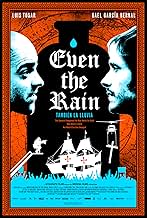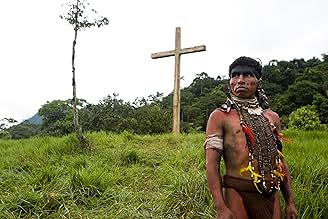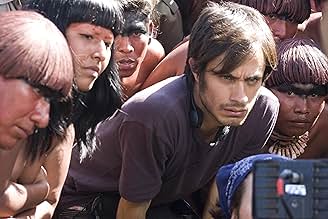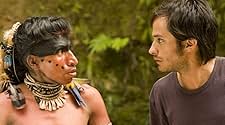As a director and his crew shoot a controversial film about Christopher Columbus in Cochabamba, Bolivia, local people rise up against plans to privatize the water supply.As a director and his crew shoot a controversial film about Christopher Columbus in Cochabamba, Bolivia, local people rise up against plans to privatize the water supply.As a director and his crew shoot a controversial film about Christopher Columbus in Cochabamba, Bolivia, local people rise up against plans to privatize the water supply.
- Awards
- 22 wins & 17 nominations total
- Director
- Writer
- All cast & crew
- Production, box office & more at IMDbPro
Featured reviews
I found it very easy to identify with all of the main players thanks to some great performances from all involved and also a really nicely written script. It's really well shot with nice big, easily legible subtitles (more like this please foreign filmmakers!). It was interesting to see a film set in that region, we don't see very much from that part of the world. There are also some historical facts about the conquistadors that I wasn't aware of and so it even educated be a little! I love the way it slowly dawns on the crew that the mistakes made 500 years previously are still being made today! Over all, I found it well worth a look and it's one I would certainly look at again sometime.
SteelMonster's verdict: RECOMMENDED
My score: 8.3/10
You can find an expanded version of this review on my blog: Thoughts of a SteelMonster.
SteelMonster's verdict: RECOMMENDED
My score: 8.3/10
You can find an expanded version of this review on my blog: Thoughts of a SteelMonster.
EVEN THE RAIN, directed by Icíar Bollaín, is a compelling film which attempts to explore the history of global economics using a kind of cinematic metaphor. Bollain's film focuses on a multinational movie crew that travels to Bolivia to make a film about Christopher Columbus, and examines his agenda of religious, cultural, and monetary exploitation of The New World. The production company hits a snag when locally violent demonstrations breakout against corporate ownership of indigenous water rights, and threaten to make the completion of the film impossible. The movie shows that the issues of wealth, ownership, and power are just as contentious today as they were five hundred years ago. Corporate giants of our era employ the same greedy strategy in an attempt to steal wealth, power, and access from the uninformed and defenseless. Although the ethical issues in the film are sometimes presented in a slightly heavy-handed manner, by the end of the feature, it is evident that the application of rapacious economic policy hasn't changed much since monarchs ruled the world.
Even the Rain (2010)
There are so many stunning, powerful, dramatic, believable moments to this hard hitting film, you wish so much that there weren't a few unreasonable gaffes to the plot and characters. It's frustrating when a film is almost amazing, because you are reminded of what it was not.
But also what it is, which is pretty thrilling and clever.
First, the contemporary setting is based quite closely on the true events of local Bolivians in the third largest city of the country, Cochabamba, fighting for rights to their own water supply. A private (Euro-U.S.) firm has cornered water rights and when the locals try to use their own handmade supply system the police come and interfere. It's maddening to the point of anger on both sides of the screen. In a way, this local uprising against injustice is the movie, the core of the events.
But what makes it actually fabulous is the way it told through the eyes and cameras of a large film crew working on a movie about Christopher Columbus arriving on the shores of America and mistreating the natives. Yes, a parallel that is obvious but handled with dramatic aplomb. There are many moments showing the shooting of the film, and it transports the viewer instantly and beautifully to the Columbus events, which are epic in their own way. But the characters are part professional actors from other countries and part local (and underpaid) extras, some of whom are involved in the water protests when not filming.
So there are several layers of action, tightly interwoven. The disdain and fear of some of the outsiders is believable (the man playing Columbus, Karra Elejalde, is amazing, world weary and tough, taking both sides as needed). Some of the circa 1500 history of resistance by the natives and even the brave defense of the natives by a Spanish priest is inspiring. And the way it still applies 500 years later (500 years!) is depressing. And energizing.
There are some other small problems, maybe the result of editing down too much later, such as the inclusion at the start of black and white video footage, a documentation of the filming, that you think will then become news footage (or not) but then it just disappears as a component of the film, completely, for no reason. And then the tumult of the last half hour with riots and roadblocks is great stuff, really well done, but so highly improbable you have to just write it off to generous screen writing. We aren't really able to believe the wholehearted change of attitude of the producer (played with intensity by Luis Tosar), but it makes for great interpersonal (and sympathetic) dramatics. And finally the director of the movie within the movie is played by the ever beautiful Gael Garcia Bernal, but in fact he's too weak and thoughtful a type to be directing this sprawling and frankly unmanageable movie about Columbus.
But these objections actually only came up for me later, thinking back. While immersed, I was really immersed and impressed. It's an ambitious, smart, and pertinent movie, with great and enjoyable complexity.
There are so many stunning, powerful, dramatic, believable moments to this hard hitting film, you wish so much that there weren't a few unreasonable gaffes to the plot and characters. It's frustrating when a film is almost amazing, because you are reminded of what it was not.
But also what it is, which is pretty thrilling and clever.
First, the contemporary setting is based quite closely on the true events of local Bolivians in the third largest city of the country, Cochabamba, fighting for rights to their own water supply. A private (Euro-U.S.) firm has cornered water rights and when the locals try to use their own handmade supply system the police come and interfere. It's maddening to the point of anger on both sides of the screen. In a way, this local uprising against injustice is the movie, the core of the events.
But what makes it actually fabulous is the way it told through the eyes and cameras of a large film crew working on a movie about Christopher Columbus arriving on the shores of America and mistreating the natives. Yes, a parallel that is obvious but handled with dramatic aplomb. There are many moments showing the shooting of the film, and it transports the viewer instantly and beautifully to the Columbus events, which are epic in their own way. But the characters are part professional actors from other countries and part local (and underpaid) extras, some of whom are involved in the water protests when not filming.
So there are several layers of action, tightly interwoven. The disdain and fear of some of the outsiders is believable (the man playing Columbus, Karra Elejalde, is amazing, world weary and tough, taking both sides as needed). Some of the circa 1500 history of resistance by the natives and even the brave defense of the natives by a Spanish priest is inspiring. And the way it still applies 500 years later (500 years!) is depressing. And energizing.
There are some other small problems, maybe the result of editing down too much later, such as the inclusion at the start of black and white video footage, a documentation of the filming, that you think will then become news footage (or not) but then it just disappears as a component of the film, completely, for no reason. And then the tumult of the last half hour with riots and roadblocks is great stuff, really well done, but so highly improbable you have to just write it off to generous screen writing. We aren't really able to believe the wholehearted change of attitude of the producer (played with intensity by Luis Tosar), but it makes for great interpersonal (and sympathetic) dramatics. And finally the director of the movie within the movie is played by the ever beautiful Gael Garcia Bernal, but in fact he's too weak and thoughtful a type to be directing this sprawling and frankly unmanageable movie about Columbus.
But these objections actually only came up for me later, thinking back. While immersed, I was really immersed and impressed. It's an ambitious, smart, and pertinent movie, with great and enjoyable complexity.
I really enjoyed the film "Even in the Rain" because the movie had two stories going side by side. It was like a movie inside a movie, which was one thing that I really enjoyed about the movie. Overall the movie was very easy to understand. There might have been one scene that was not that clear to me but I got the general idea of it anyways so it was not really a big problem. If this was an American film the problem would have been solved in the movie, so it different from American films. To my understanding the problem was not resolved in this film. This film taught me how people in other parts of the world are living today and that people do not have the things that we take for granted all time. Also this film sort of taught us about the past which I taught was very interesting. It showed us how the British were treating the Natives. If was the director of this film I would have made it so at the end of the film everyone had water.
This is a great movie; a movie inside another movie, a movie out of another movie. Told a story when the Spaniards under the command of Christopher Columbus brutalized and ransacked Bolivia, then the government was bought out and mustered in the big corporate came in modern time to raped the country, took away the local people's water resource, the well, the water supply. Just like what the demonstrators said: "They need the vapor from our breaths, the sweat on our brows, they even want to take the rain dropping from the sky(Even The Rain)". The third storyline is the movie company that wanted to take advantage of the poor country's poverty and high unemployment, getting the cheap labors to shoot the movie. "The truth got many enemy, the lie got many friends", "You don't understand, water is our life", these dialog are so profound and true. Unfortunately, the movie crew was in the wrong time and at the wrong place encountered the explosion of the street riots and the demonstrations. This is a very complicated movie but shot so well to portray all the involving parties and single person got their own demons, dilemmas, tensions, numbness, helplessness, and hopelessness,self-denial, cowardice, depression and frustrations. The complexity of this movie was so vividly painted on the big screen. This is a great movie.
Did you know
- TriviaThe scene where the little girl sees herself on screen was kind of a self homage by director/actress Icíar Bollaín. She wanted to transmit her first impression when she saw herself on screen being a teenager.
- ConnectionsFeatured in Ebert Presents: At the Movies: Episode #1.6 (2011)
- How long is Even the Rain?Powered by Alexa
Details
Box office
- Gross US & Canada
- $518,017
- Opening weekend US & Canada
- $53,730
- Feb 20, 2011
- Gross worldwide
- $7,313,485
- Runtime
- 1h 43m(103 min)
- Color
- Sound mix
- Aspect ratio
- 2.35 : 1
Contribute to this page
Suggest an edit or add missing content































